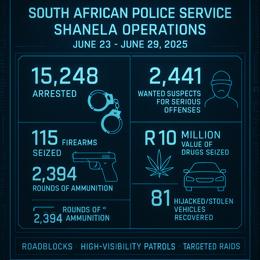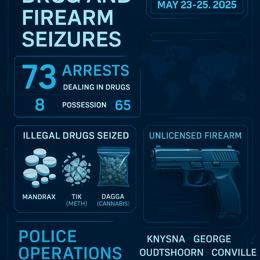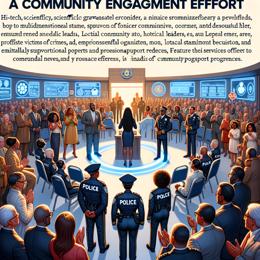Picture: for illustration purposes
Decline in Police Reservists Exacerbates South Africa's Battle Against Crime
South Africa's fight against high crime levels has encountered a significant setback as statistics reveal that the South African Police Service (SAPS) has experienced a staggering 90% reduction in the number of police reservists over the past ten years. This decline coincides with a period marked by persistent and alarming criminal activities across the nation.
In an illuminating parliamentary response, Police Minister Bheki Cele disclosed the stark decrease to just 3,502 reservists as of October 31, down from a high of 52,054 in the 2011/12 financial year. The trend is worrying, given the importance of reservists in augmenting the work of full-time officers.
Amidst this decline, there remains a glimmer of hope; the SAPS has budgeted a hefty R5.7 billion with the aim of adding 30,000 officers by 2026, and has initiated aggressive recruitment drives to permanently employ qualifying reservists into the police force. Nonetheless, the current number of reservists is insufficient in Gauteng, the province with the highest number of reservists, and particularly in the thinly spread Northern Cape.
Lirandzu Themba, a spokesperson for the police ministry, has encouraged the community to join as reservists to strengthen the fight against crime. However, this call to arms seems to resonate little, given the precipitous drop in reservist numbers.
DA MP and spokesperson on police, Andrew Whitfield, accused Cele of undermining the immediate opportunity to increase “boots on the ground,” and highlighted the concerning crime statistics that exacerbate the urgency of this issue—over 6,000 murders and more than 10,500 rapes reported in only three months.
There are indeed various reasons behind the dwindling numbers, including natural and voluntary attrition. Regardless, Whitfield articulated that the cut in reservist numbers deals a devastating blow to crime-fighting efforts at a time when the bolstering of police personnel is sorely needed. Moreover, Whitfield criticized the ministry's approach to officer recruitment and the shortage of active reservists as significant contributors to the problem.
Cele's update on the planned intake of 12,000 new officers in the 2023/24 period, despite the promised budget for recruitment, raises questions about whether this increase will suffice in tackling crime effectively.
The SAPS's ongoing struggles to reinforce its ranks are further highlighted by Cele's clash with Gauteng Premier Panyaza Lesufi, who has pointed out the oversight in recognizing the province’s 6,000 crime wardens.
As South Africa grapples with the reality of high crime rates and a depleted reserve police force, the need for a strategic and substantial bolstering of the police service becomes increasingly apparent. Without a swift and efficient plan to recruit and retain reservists, combined with clear government support, the crux of South Africa's internal security remains at risk.










